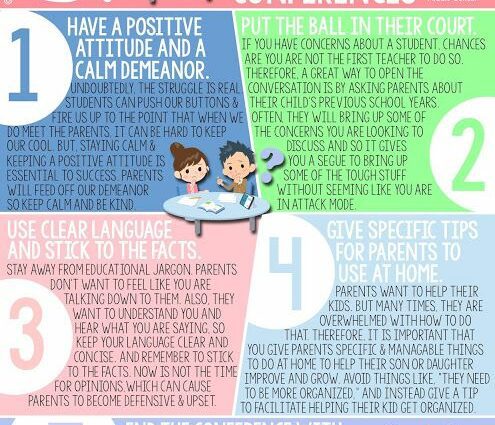Contents
Parents teachers: how to have an effective relationship?
The relationship with teachers is important to be able to discuss daily concerns, as well as the progress of learning. Teachers are trained to give the necessary information to the parents of their students. So do not hesitate to ask them.
To present oneself
From the start of the school year, it is necessary to take time to introduce yourself to the teachers. Through information days at the start of the school year or by making an appointment, introducing yourself to the teacher gives him the opportunity to clearly visualize the parents of his students. This allows parents to:
- have a first contact;
- show that they are involved in the education of their child;
- discuss their expectations;
- listen to the teacher’s expectations and goals.
Exchanges during the year will be facilitated, since both parties know that dialogue is possible.
During the school year
Teachers plan to take stock. It is important to respond to them and to stay tuned to the difficulties encountered if there are any.
A teacher who does not note any point of improvement does not mean that he is losing interest in the student, but that for him, the student does not present any difficulties to mention in the development of his learning.
On the contrary, if points of behavior or learning are underlined, it is good to obtain concrete details of the content that causes concern (memorization, calculations, spelling, etc.) and to find together modifications or academic support to be made. on these specific points.
During the school year, teachers can be contacted via the digital interfaces set up by schools. Parents can log in to see:
- homework ;
- the notes ;
- ask for clarification;
- find out about school trips;
- inquire about class councils, parent-teacher meetings.
An appointment is possible outside the reserved times. Via this digital platform or directly with the school’s secretariat, parents can ask to meet a teacher when they need to discuss a particular point.
Changes in personal circumstances
It is not always easy to talk about your private life with a teacher, but family balance can affect school results. Without going into details, it is therefore necessary to inform the teaching team of the changes: separation, bereavement, accidents, planned moves, trips, absence of one of the two parents, etc.
Teachers will thus be able to make the link between a painful and difficult situation for the pupil to manage and a sudden alteration in concentration, a change in behavior or the occasional drop in his results.
Most teachers have a real desire to support their students as best they can and they will be all the more understanding and adapt their requests if they are informed of the situation.
It is also necessary to distinguish the teacher from the psychologist or the specialized educator. A teacher is dedicated to school pedagogical learning. He is in no way present to advise parents on their couple’s problems, on health concerns, and is not trained in pathologies linked to mental disorders. Parents will have to turn to other professionals (attending physician, psychologists, speech therapists, specialist educators, marriage counselors) for advice.
End of the school year
When the school year ends, teachers take stock of the year. Parents are informed via the notebook, class advice on the development of learning and the recommended orientation for the pupil.
Repetitions are generally mentioned in the middle of the year. They are confirmed at this time. Parents are offered the possibility of appealing. A protocol must then be respected according to a well-defined schedule. It is recommended to get information from a parents’ union and to be accompanied.
Health problems
Each student completes a questionnaire at the start of the school year in the registration file which mentions:
- his allergies;
- pathologies to report;
- contacts (attending physicians, guardians) to call in an emergency;
- and anything that can be useful for the teaching team to listen to the student.
A PAI (Individualized Reception Project) can be set up at the request of parents, the attending physician and the teaching team. This document is established in order to provide support to students with health problems over a long period and requiring accommodation.
The pupil will be able to benefit from:
- more time for exams;
- an AVS (Auxiliaire de Vie Scolaire) who can help take notes or understand instructions;
- computer hardware;
- photocopies with the font in large letters;
- etc.
Teachers can thus adapt their materials to the needs of the student and seek advice from their colleagues to modify their teaching.
Behavior problems
Teachers have classes of an average of 30 students. They are therefore obliged to put in place rules for the group to function. Certain behaviors are unacceptable, such as verbal or physical violence, parents are warned quickly and the student sanctioned.
Oral exchanges, “chatter” are tolerated or not depending on the teachers and the subject on which they are working. Parents should remain attentive to the teacher’s requests and explain to their child that certain learning situations require calm: chemical manipulations for example, listening to sports instructions, etc. A student has the right to speak, but not all at the same time.
Relations between parents, teachers and students also involve notions of politeness. If the child sees his parents say “hello”, “thank you for these documents”, he will do the same. Effective communication is related to respecting each person’s role.










